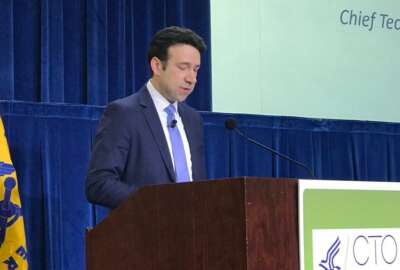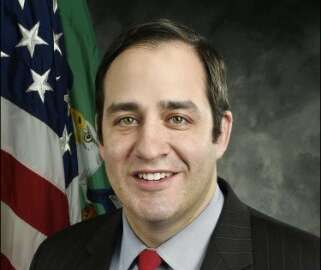
Why the new HHS CIO is not your usual suspect
HHS named Jose Arrieta, the deputy assistant secretary and senior procurement executive, to be its new chief information officer, making him one of only a few...
The Department of Health and Human Services has made an unconventional choice for its next chief information officer.
Instead of going with a traditional technology executive, Federal News Network has confirmed that HHS chose someone with a contracting and technology background. Jose Arrieta, the deputy assistant secretary and senior procurement executive, replaced Beth Killoran, who left the role in August, as HHS’s new CIO.
Ed Simcox, the HHS chief technology officer, has been acting CIO since Killoran left the position.

“I believe Jose will be a tremendous leader and take our organization into the future. His expertise, innovative spirit and strong track record of success makes him a natural fit,” HHS Deputy Secretary Eric Hargan said in an email to staff obtained by Federal News Network. “He will help lead the development of HHS-wide IT strategy with an immediate focus on cybersecurity, cloud computing, and emerging technology. Mr. Arrieta has built a strong reputation among his peers within the federal government and with industry stakeholders.”
Arrieta has never held the role of a CIO, but has worked extensively in the IT sector through his acquisition background.
One HHS source called the decision “an interesting pick, but in a good way.”
The source, who requested anonymity because they didn’t get permission to speak to the press, praised the decision to go with Arrieta and expects him to make big impact, especially where previous CIOs struggled to transform the agency’s technology programs and processes.
“As CIO, he will report to me for strategy and policy and continue to advise the Office of the Secretary on all matters relating to information technology,” Hargan said. “He will also report to the Assistant Secretary for Administration (ASA) [Scott Rowell] for administrative and service delivery duties. I believe Jose will be a tremendous leader and take our organization into the future. His expertise, innovative spirit and strong track record of success makes him a natural fit. He will help lead the development of HHS-wide IT strategy with an immediate focus on cybersecurity, cloud computing and emerging technology.”
New CIO behind HHS Accelerate
Arrieta has a history of bringing technology innovation to bear through his positions.
He has been at HHS for about 17 months and during that time jumped into emerging technologies like blockchain for a new contract writing system and artificial intelligence to analyze how and what the agency buys.
Related Stories
“During his tenure at ASFR, he spearheaded HHS Accelerate, the first block chain-based capability to receive an authority to operate in the federal government. This momentous achievement added an important capability that will help the department streamline its processes to procure products and services from vendors,” the email states.
Before coming to HHS, Arrieta ran the IT schedule for the General Services Administration, where he also was among the first in government to test out the distributed ledger or blockchain technology.
In that effort, Arrieta and his team at GSA studied the business process of Schedule 70 contracts—what vendors had to go through to get the contracts established — and identified the two longest processes in what Arrieta called the “optimal path” — financial analysis of the company and the prenegotiation memorandum. They then instituted blockchain by putting everything in a distributed ledger and redesigned the user interfaces so that industry only has to enter the information once instead of logging into multiple systems, and ran microservices to automate the processes.
Arrieta joined the government in 2004 as a contracting officer at GSA. He then moved to be a program manager at the Transportation Security Administration in 2010 and two years later became the industry liaison and ombudsman for the entire Department of Homeland Security.
Then in 2014, he joined the Treasury Department as its director of the Office of Small and Disadvantaged Business Utilization (OSDBU).
Tall workload, stronger CIO shop ahead
As CIO, Arrieta will have his work cut out for him. HHS has an IT budget of $6.3 billion in fiscal 2019. The White House requested $600 million less in 2020.
According to the Federal IT Dashboard, HHS has 95 major IT investments and 85% are on schedule and 84% are on budget.
He also inherits a more powerful CIO shop than any previous technology executive. Under the Federal IT Acquisition Reform Act’s December scorecard, HHS earned a B+ grade, up from a D in 2015, thanks in part to a strategy that focused on data, dialogue and the delivery of services.
HHS also instituted an internal FITARA dashboard and had discussions, specifically around CIO reporting, data center optimization and cross-agency cyber priorities.
Among his biggest challenges will be to raise the level of HHS’s cybersecurity defenses and get the operating divisions marching down the same path around things like cloud, data and shared services.
The most recent Federal Information Security Management Act report by the agency’s inspector general found, “Based on the results of our evaluation, we determined that HHS’ information security program was ‘not effective’ as it did not meet the ‘managed and measurable’ level in the following functional areas: Identify, protect, detect, respond and recover. HHS is a federated environment which brings challenges in attaining a ‘managed and measurable’ maturity model for all operating divisions. We assessed identify and protect at the ‘consistently implemented’ level, with detect, respond and recover being assessed at the ‘defined’ level.”
Copyright © 2025 Federal News Network. All rights reserved. This website is not intended for users located within the European Economic Area.
Jason Miller is executive editor of Federal News Network and directs news coverage on the people, policy and programs of the federal government.
Follow @jmillerWFED






